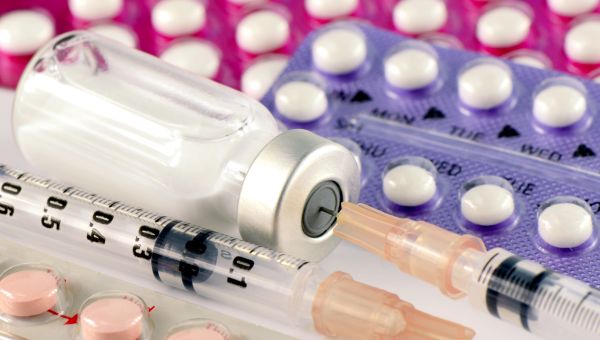7 Reasons You Miss Your Period (Without Being Pregnant)
Skipping a menstrual cycle doesn’t always mean you’re pregnant.
Updated on January 11, 2024

Most people with a uterus have 11 to 13 menstrual cycles per year, but many have fewer, and many have more. Whether or not you're trying to get pregnant, a late or missed period can bring all sorts of emotions: excitement, fear, anxiety, and relief, just to name a few.
Secondary amenorrhea is the technical term for missing your period for more than three cycles, even though you’ve had typical cycles before. And while pregnancy is the most common cause, a variety of things, from stress to thyroid issues, may prevent you from having your period this month. Here’s what you need to know about these conditions, and how they affect your menstrual cycle.

Low body weight or excessive exercise
When your body weight or body fat percentage is low or you’re burning more calories than you’re taking in (a large calorie deficit) you may experience hypothalamic amenorrhea. This halt in your period occurs because the hypothalamus—the part of the brain that acts like a master switch that controls hormone production—slows down or stops making gonadotropin-releasing hormone, which usually kicks off the menstrual cycle.
To help regulate your hormones, it’s important to adopt healthy eating and exercise habits. A trainer, nutritionist, or primary care physician can work through food and exercise plans that are right for your body, and your schedule.

Perimenopause
Perimenopause typically begins about four years before menopause—typically in the 40s for most people with their uterus. During this transition period, your level of the hormone estrogen fluctuates, leading to irregular periods. You may not have a period at all for a few months, your period may be extremely heavy for a while, or you may have spotting between your periods.
If you’ve noticed signs of perimenopause and then your periods stop completely for 12 months or more, it’s likely you’re in menopause. If your periods last longer than seven days or are less than three weeks apart, or, if you’re worried about period fluctuations, see a healthcare provider.

Stress
Mental stress and anxiety can pose sleeping problems and lead to headaches, weight gain, and, if severe, temporary hypothalamic amenorrhea. The hypothalamus malfunction causes the ovaries to stop producing eggs, and menstruation stops, just as it does with excessive exercise and inadequate nutrition.
If you're lethargic, irritable, depressed, or having mood swings, stress-relieving techniques like meditation can be helpful, or you may need to see your healthcare provider to determine other treatment options. Once your stress levels and sleep improve, it’s likely your menstrual cycles and periods will become more regular, too.

Thyroid conditions
Thyroid conditions like hyperthyroidism and hypothyroidism cause hormone fluctuations, which can affect your menstrual cycle.
When you have hypothyroidism, your thyroid, the butterfly-shaped gland towards the base of your neck, isn’t producing enough thyroid hormone. This potentially slows your metabolism. Hypothyroidism can make your periods become irregular or stop completely, or you may bleed more than usual.
If you have hyperthyroidism, you produce more thyroid hormone than you need, and your heart rate and metabolism may increase. You might also notice fewer periods, lighter periods, or no periods at all.

Polycystic ovary syndrome
Polycystic ovary syndrome (PCOS) is a common health condition, affecting 5 to 10 percent of women between ages 15 to 44. PCOS is caused by an imbalance of reproductive hormones and makes it harder to get pregnant. Typically, each month, an egg made by the ovaries is released during ovulation. But for those with PCOS, the egg may not grow as it should and may not release at all.
If you have PCOS, you may notice your periods are sporadic, or they may stop altogether. It’s not uncommon for those with PCOS to have more frequent periods, either, meaning they occur every 21 days or less. Treatment for PCOS is typically a combination of medications—like birth control or anti-androgens—and at-home management techniques, such as weight loss and skin treatments to slow hair growth.

Birth control and other medications
Certain birth control pills, injectable contraceptives, and intrauterine devices may cause you to miss periods. While this may be the intended effect, talk to your OBGYN if skipping periods makes you feel uncomfortable, so you can try a different kind.
If you opt out of birth control altogether, your periods should return to baseline after you’ve stopped taking birth control for a few months.
In rare cases, certain other drugs, such as antipsychotics or blood pressure medications, may also cause amenorrhea by raising levels of prolactin, a hormone that stops both ovulation and your menstrual cycle.

Breastfeeding
If you’ve had a baby and are breastfeeding, your menstrual cycle may be a little off, since nursing can delay or temporarily stop periods and ovulation. It doesn’t guarantee you won’t get pregnant, though. Talk to your OBGYN about birth control options that are safe for breastfeeding parents.
Your period should return about a month after you stop nursing, but it may take a few months for the cycle to be regular again. It may come back, too, when your child is introduced to solid foods or formula supplementation.

University of Michigan Health. Missed or Irregular Periods. Current as of November 22, 2021.
NIH: Eunice Kennedy Shriver National Institute of Child Health and Human Development. About Amenorrhea. Last reviewed January 31, 2017.
HealthyWomen.org. Heavy Periods. September 24, 2009.
Mayo Clinic. Perimenopause. August 7, 2021.
National Health Service (UK). Stopped or missed periods. Last reviewed August 2, 2019.
Cleveland Clinic. Can Stress Cause You to Skip a Period? September 18, 2020.
WomensHealth.gov. Polycystic ovary syndrome. Page last updated February 22, 2021.
Torre DL, Falorni A. Pharmacological causes of hyperprolactinemia. Ther Clin Risk Manag. 2007 Oct;3(5):929-51.
WomensHealth.gov. Breastfeeding and everyday life. Page last updated February 22, 2021.
More On


video

slideshow


video


video
